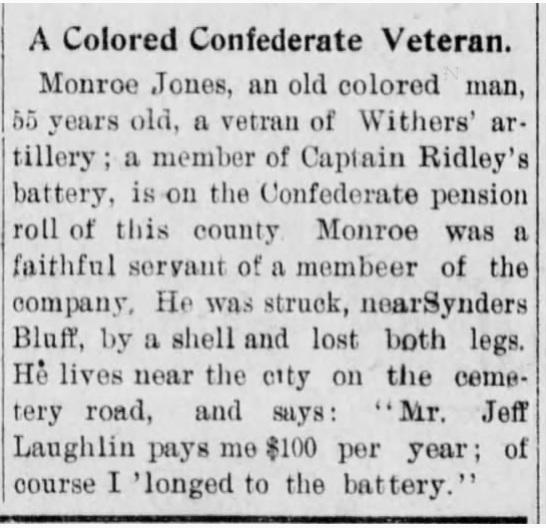The "Cornerstone" of the Confederate Army Was Slavery
Describing Slaves as Soldiers Isn't Just a Lie. It Dishonors Their Memory
I came across this newspaper clipping on the same twitter feed that I referenced a few days ago. I thought I would use it to make a quick point about the importance of historical context and memory.
This is a point that I will continue to make until I am blue in the face.
Our tendency to see slavery in the context of the plantation and other antebellum settings obscures the fact that it was integral to the Confederate war effort. As I explore in my book, Confederate armies included thousands of enslaved men, who performed a wide range of roles that allowed armies to camp, march, and even fight.
When a body servant or camp slave followed his master into the army, the institution of slavery followed.
The war was a continuation and not a departure in the relationship between master and slave. When white Southeners waxed poetic about former “faithful servants” such as Monroe Jones they were intentionally obscuring this fact and when we do it today we are perpetuating this myth. More importantly, we brush aside the violence and horror that continued to define slavery right through to the end of the war in 1865.
Read this brief news clipping and then read it again.
Think about the extent that people went, decades after the war, to dehumanize and emasculate the formerly enslaved in order to maintain a self-serving fantasy about the war. Let’s leave aside the question of how these Lost Cause narratives functioned at this time and focus on Monroe Jones.
White southerners would have you believe that Jones’s injuries were the equivalent to the injuries that tens of thousands of Confederate soldiers sustained on the battlefield. Jones, however, was not a soldier. He did not volunteer to fight nor was he drafted by a government that demanded his service.
Arguing about whether Jones was a soldier or whether the injuries that he sustained somehow transformed him into a soldier moves us further from a fundamental fact.
The injuries that Monroe Jones and other body servants sustained while present in the Confederate army must be understood as a result of their enslavement. It wasn't "Yankee" shells and bullets that were responsible for taking Jones's legs, but the man who owned and exposed him to the dangers of the battlefield.
No amount of postwar posturing changes this.
Finally, let's not lose sight of the fact that this man lost his legs while being forced to aid an army that, if successful, would have kept him and his family enslaved. Framing this in any other way is nothing more than Lost Cause-inspired wishful thinking.
The fact that we don’t immediately see Jones’s injuries, alongside other images and stories of slave violence, is an indication that we still have a lot of work to do to come to terms with this history.





I wonder how many African Americans were members of the United Confederate Veterans. I'd wager none, because real confederates never considered them soldiers.
And of course Mackey said he belonged to the battery - his not-generous-in-1902 monthly income depnded on his saying it.